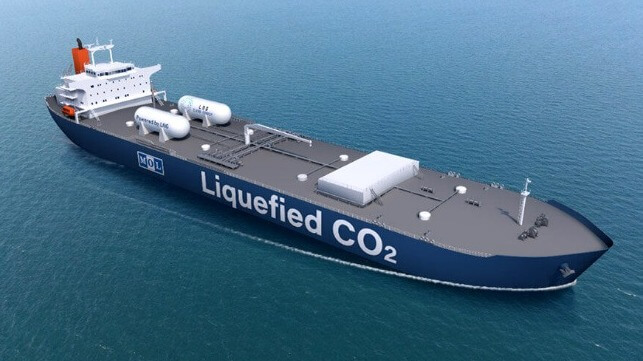MOL Gains Design Approval for First Large LCO2 Carrier from ClassNK

Japan’s Mitsui O.S.K. Lines is continuing its aggressive move to develop the large scale transport of CO2 emerging as one of the leaders in this new sector. Capture and transport of CO2 is a critical component of many industries and countries' long-term plans for decarbonization but to achieve it requires the development of a new class of vessel uniquely suited to what has traditionally been a small, niche operation.
In the latest development, MOL reports it received Approval in Principle, for its design for a large CO2 carrier. ClassNK reviewed the designs and issued the approval for a vessel capable of transporting 64,000 cubic meters of liquified CO2. MOL has been seeking to apply its experience with transporting other gas cargoes to develop this new sector. While the company did not release complete dimensions for the vessel concept, the carrying capacity is nearly a quarter larger than the concept MOL previously discussed that it was developing with Mitsubishi Shipbuilding that had a maximum capacity of up to 50,000 cubic meters.
In June 2021, MOL launched a research and development project for the adoption of a large-scale liquefied CO2 carrier in response to a call for proposals by Japan's New Energy and Industrial Technology Development Organization (NEDO). The government-supported organization challenged participants to complete the conceptual design to support Japan’s broader vision for carbon capture. NEDO is sponsoring projects for the development of technology for carbon capture, storage, and reuse as well as for transporting large quantities of CO2 for permanent storage offshore.
Research for this project is being led by Japan CCS Co., a company launched in 2008 dedicated to demonstration projects pertaining to carbon dioxide capture, utilization, transportation, and storage technologies. MOL is involved in a series of research projects seeking to develop efficient designs for the transport of CO2.

that matters most
Get the latest maritime news delivered to your inbox daily.
As part of its projects, NEDO has estimated a potential need to transport up to one million tons per year of CO2. The long-distance transport to storage which could be in abandon well and other structures would support the storage solutions while additional quantities of CO2 could be utilized in other industrial applications.
In addition to its involvement in the research efforts, MOL was the first large shipping company to invest in the existing market for the transport of CO2. MOL invested in the Norwegian shipping company Larvik Shipping in March 2021 both as an entry into the sector and to learn from the company’s 30 years of experience in the transport of CO2. Larvik is one of a limited number of companies in the world qualified to operate liquefied CO2 vessels for what is known as food grade CO2, which is used by hospitals, breweries, and the food industry. Larvik operates five gas carriers currently the largest having a capacity of 1,770 tons of CO2.
